Botswana’s President Mokgweetsi Masisi has acknowledged defeat in the recent elections, marking the end of the ruling party’s 58-year reign in power. The early results showed the ruling Botswana Democratic Party (BDP) trailing in fourth place, while the main opposition party, the Umbrella for Democratic Change (UDC), took the lead. This historic shift in power signals a significant change in Botswana’s political landscape and opens up new opportunities for governance and policy-making in the country.
The unexpected election outcome comes as a surprise to many, as the BDP has been the dominant political force in Botswana since the country gained independence in 1966. The party’s long-held grip on power has been challenged by growing dissatisfaction among voters over issues such as corruption, unemployment, and healthcare. The UDC’s victory represents a rejection of the status quo and a desire for change among the electorate, signaling a potential shift towards a more inclusive and progressive government in Botswana.
President Masisi’s concession of defeat demonstrates a commitment to the democratic process and a respect for the will of the people. By gracefully accepting the election results, Masisi has set a positive example for other political leaders in Africa and around the world. This peaceful transfer of power is a testament to Botswana’s strong democratic traditions and its commitment to upholding democratic values and principles.
The UDC’s victory in the election opens up new possibilities for governance in Botswana, with the potential for policy changes and reforms to address the country’s pressing challenges. The new government will need to work quickly to address issues such as corruption, unemployment, and healthcare, and to restore public trust in the political system. The UDC’s victory represents a fresh start for Botswana and an opportunity to build a more inclusive and equitable society for all its citizens.
As Botswana transitions to a new government, there will likely be challenges and obstacles to overcome in the coming months. The UDC will need to navigate the complexities of governing and work to fulfill its promises to the electorate. The party will also need to work to build consensus and unity among the diverse political factions in Botswana in order to govern effectively and implement meaningful reforms. The success of the new government will depend on its ability to address the country’s pressing challenges and deliver on its commitments to the people.
Overall, Botswana’s recent election represents a historic moment in the country’s political history, marking the end of the ruling party’s long-held grip on power and the beginning of a new era of governance. The UDC’s victory signals a desire for change among the electorate and an opportunity to build a more inclusive and progressive society in Botswana. As the new government takes office, there will be challenges to overcome and obstacles to navigate, but there is also a sense of optimism and hope for a brighter future for Botswana.


